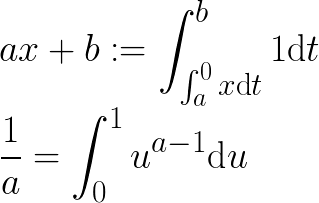Given a polynomial in one variable with rational coefficients, output an equivalent expression containing only 1, variables, and definite integrals. For example, -x2 can be expressed as ∫x∫111dtxdu.
E := 1 | var | ∫EEEdvar
Any reasonable input/output method is allowed.
Examples:
Your score will be the your code length multiplied by the number of ∫ symbols used on the test cases. You should be able to score your program. Lowest score wins.
Test cases:
4/381*x^2+49/8*x^3-17/6
311/59*x^2-92/9*x^3-7/15*x
333/29*x^3+475/96*x^8
Golfing is going to be difficult, because I can't golf just the code or just the output, and I therefore do not know if a change will help or hurt my score until I try it, which sucks in my opinion.
Don't let the score restrict your creation. You are welcomed to answer with mainly one part of the score well optimized, even if the other one badly left.











chr(8747)(or equivalent) to a variable, and using that as the sign, incurring zero occurrences of the symbol. I'd strongly recommend making this a vanilla code golf challenge. \$\endgroup\$0=[1,1,1], it's still counted as "1∫". Thus you can only get 0 score on test case1andx\$\endgroup\$